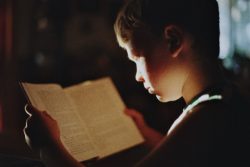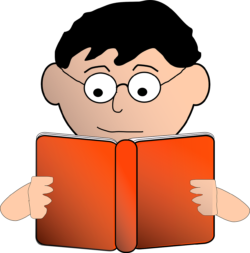
I am very happy to present this guest post by my friend Bart Scott — lawyer, musician, and writer.
Bart Scott set out to become a college English teacher but blinked and wound up in law school. He practices criminal defense in Northern California, and considers the human failings that feed his practice to be both real and literary. He has also been known to sneak literary references into his briefings.
Weave a circle round him thrice,
And close your eyes with holy dread
For he on honey-dew hath fed,
And drunk the milk of Paradise.
He plays blues, rock, and country music on guitar and is anticipating retirement from the law within the next year.
***********************************************************************************************
When I was a child growing up in suburban California, reading was something that distinguished, and divided, me from my peers. I was small, shy, and near-sighted. There was no team for which anyone wanted to choose me. I had a couple of friends, but I was not a social butterfly. The transition to bookworm was easy.
We had a bookmobile from the local library that stopped right in front of our house every Wednesday. My mother—an avid reader to this day—would check out books for the five kids.
I still remember the book that taught me the printed page was a richer world than the playground at Portola Elementary School. It was Kee and Bah: Navajo Children by Elizabeth Pack. My guess is that I was in third grade, and I sat on an overstuffed chair in the living room and read until 11:00, way past my bedtime. My mother must have perceived an English major in the making; she let me read until I finished the book.
From then on, books were my thing. I had no need for kickball (at which I sucked) or other sports. Were there other sports? I wouldn’t have known.
In the fourth grade, I read Van Loon’s The Story of Mankind. I recall only one aspect of the book: the preface. He wrote that if there were a huge rock in the wilderness, and every year a bird came to the rock to sharpen its beak, when the rock had been worn away, one day of eternity would have passed. I know the book introduced me to a concept of the arc of history, but I have no idea if it was another apology for white colonialism. The important thing for me was the awareness there were other people living different lives from the repugnant playground.
Then there was The Travels of Jamie McPheeters, an adult bestseller about America’s westward expansion. The protagonist was in a wagon train traveling west, and the book offered rape, murder, and—at one point—a guy getting deservedly skinned alive. I was in fifth grade. In my book report I wrote, with no suggestion of irony, that I would not recommend the book for children.
The books kept coming. The Rise and Fall of the Third Reich in seventh grade; all of Kenneth Roberts’s historical novels; the Constance Garnett translation of the Brothers Karamazov in eighth grade. In fact, by the time I was a sophomore in high school, I had read every novel Dostoevsky ever wrote. The Brothers Karamazov taught me an important lesson about the acquisition of knowledge. When I reread the book as an adult, I realized that the Grand Inquisitor chapter of the book, in which the inquisition prosecutes Christ, had a major role in forming my religious skepticism. See? All those book-burning morons are right.
During most of my life, reading has been a solace and a source of intellectual expansion. When I was in the Navy, I discovered the library on my ship had a damned fine collection of apparently unopened books. I read the entire Alexandria Quarter. Later I went to a Navy school to become a clerk—not that I didn’t love swabbing decks, and, yes, we really did that. The chow hall (yes, that’s what we called it) was a bus ride from the classroom. My fellow students would dash out to the bus at noon to get their ration of shit on a shingle; I pulled out a copy of James Joyce’s Ulysses and read as I walked to lunch. Leopold Bloom and the urine scent of cooking kidneys.
It was thus a forgone conclusion that I would be an English major. But I never pursued literature for the intellectual calisthenics. For me, reading was always an open window to other people’s lives, an expansion of perspective, a check on personal assumptions. The palliative for the risk of being an autodidact: the assurance that there would always be a voice in my head besides my own.
And reading has allowed me to live in my head, a place that, for all its inconsistencies, is just fine by me. Does reading still divide me from my peers? I don’t know; I just know that I have an attention span of longer than 15 seconds. You kind of need that if you are going to read.



wonderful ideas!
Definitely!
As your elder brother, I find this writing entertaining, spot-on and illuminating. It explains much and I’m glad I wrote the letter to your C.O.
You were not overstated.
Definitely not overstated! Thanks for the comment!
The Navy! You still amaze me.
Thanks for the comment;)